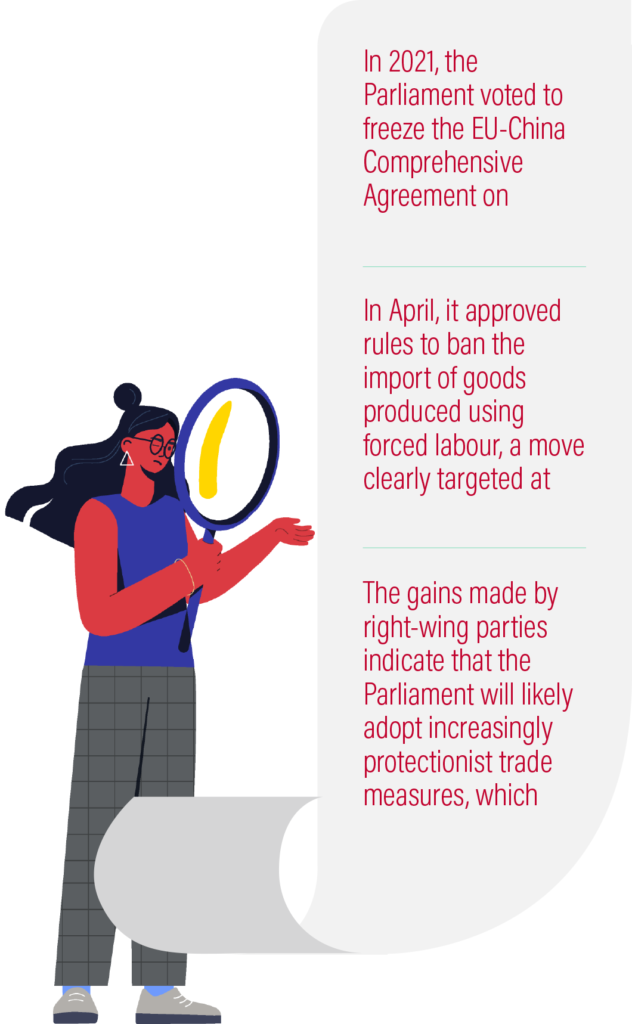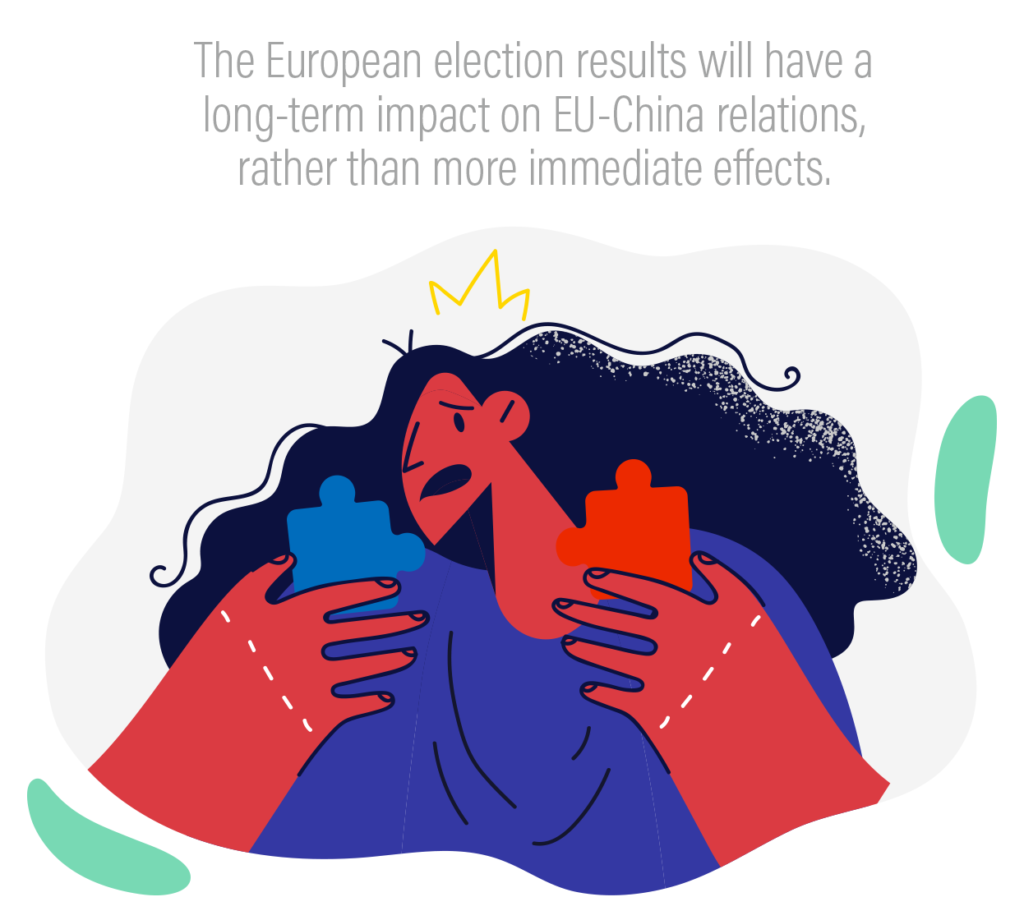
The impact on EU-China relations
In early June, citizens from the European Union’s (EU’s) 27 member states went to the polls to elect their European Parliament representatives for the 2024–2029 legislative term. In the next few months, the Parliament will approve the new members of the European Commission, having already re-elected President Ursula von der Leyen.[1] Nina Crunkhorn from APCO looks at how the new Parliament’s composition may impact EU-China relations and its implications for European businesses in China.
The European Parliament, which adopts and amends EU-wide legislative proposals, has proven to be an influential actor in the EU-China relationship. For instance, in 2021, the Parliament voted to freeze the EU-China Comprehensive Agreement on Investment (CAI). [2] Additionally, in April, it approved rules to ban the import of goods produced using forced labour,[3] a move clearly targeting China. It also supervises the work of the European Commission, which is responsible for proposing new laws and has been playing an increasingly important role in driving the EU’s tougher approach to China in recent years.
Increased political fragmentation
The two parties that dominated the Parliament during the past term—the centre-right European People’s Party (EPP) and the centre-left Socialists and Democrats (S&D)—held their ground. At the same time, most of the seats lost by the Greens were won by nationalist/far-right and populist parties, such as the Identity and Democracy Group (ID).[4] This shift has been propelled by growing opposition to green policies and immigration, as well as economic insecurity across the EU. The recent French parliamentary elections confirmed Europe’s shift to the right, with the National Rally (RN) increasing its seat count by over a third, although it won fewer seats than anticipated.[5]
The success of far-right parties means that the Parliament will be more politically fragmented, making it more challenging to find consensus on China. The 2024 manifestos of the parties that stood for election do not share much common ground on China policy. The EPP’s manifesto mentions China the most, echoing the official de-risking strategy, while the ID appears to have no agreed-upon approach. Therefore, much will depend on the voting alliances that the parties will form in the Parliament, and the role that the strengthened right-wing parties will play.
The influence of the far right

However, the gains made by right-wing parties indicate that the Parliament will likely adopt increasingly protectionist trade measures, which may affect China. The success of these parties signals widespread concerns in the EU about the current state of domestic affairs, particularly the cost of living and immigration. Therefore, the new Parliament is likely to focus on enhancing the EU’s competitiveness and protecting European industries. The European Commission already commissioned Mario Draghi to write a report on how to increase the EU’s competitiveness. The report is expected to be published in September, but Draghi has already hinted that it will address how to decrease the EU’s dependency on China.[6] This could further fuel trade tensions with China in areas where the EU perceives imports from China are endangering its own producers.
Von der Leyen’s second term
With little consensus on China among EU heads of state during President von der Leyen’s first term, she took the lead in driving the EU towards a more assertive position. Under her leadership, the Commission formulated the de-risking strategy and launched a probe into subsidies for China-based electric vehicle makers in October last year. Over the next five years, von der Leyen is likely to continue toughening the EU’s stance on China.
The impact of the US presidential election
The outcome of the upcoming United States (US) presidential election will also significantly influence the trajectory of EU-China relations. If Vice President Kamala Harris defeats Donald Trump, her administration is likely to continue many of Joe Biden’s policies, including maintaining pressure on the EU to align its policies on China more closely with the US. On the other hand, a Trump win may see his administration impose a 10 per cent tariff on all EU imports to rectify trade imbalances with the bloc and a withdrawal from NATO. Such actions would likely result in a dramatic deterioration of transatlantic relations, possibly leading to a warming of EU-China ties.
China’s reaction
While China has not officially commented on the results of the European elections, Chinese experts perceive the outcomes, coupled with the re-election of von der Leyen, as somewhat detrimental to relations. They anticipate that the gains made by right-wing parties will likely lead to increased trade tensions, while the losses incurred by the Greens may result in fewer avenues for cooperation.
At the same time, considering that the EU is China’s second-largest trade partner and a significant market for its exports, Beijing is expected to persist in trying to stabilise its relationship with the bloc — as evidenced by the number of visits to Europe by senior Chinese officials, including President Xi Jinping, Premier Li Qiang and Commerce Minister Wang Wentao.

Implications for European businesses in China
Overall, the European election results will have a long-term impact on EU-China relations, rather than more immediate effects. Significant shifts in the EU’s policies towards China are unlikely over the next several months as the EU undergoes a transition period to select and confirm leaders and members of its major bodies. With the composition of the European Commission and the US election results still uncertain, it is essential that European companies maintain geopolitical awareness.
APCO is a global advisory and advocacy firm helping leading
corporations, foundations and governments navigate a complex world. An
independent and majority women-owned company, APCO brings diverse people and
ideas together and works beyond traditional boundaries, building the un/common
ground upon which progress is made.
[1] Abnett, K, and Fiorin, M, EU Commission boss von der Leyen elected for second term, Reuters,18th July 2024, viewed 18th July 2024, <https://www.reuters.com/world/europe/eu-parliament-decide-second-term-commission-chief-von-der-leyen-2024-07-18/>
[2] MEPs refuse any agreement with China whilst sanctions are in place, European Parliament, 20th May 2021, viewed 15th July 2024, <https://www.europarl.europa.eu/news/en/press-room/20210517IPR04123/meps-refuse-any-agreement-with-china-whilst-sanctions-are-in-place>
[3] Products made with forced labour to be banned from EU single market, European Parliament, 23rd April 2024, viewed 15th July 2024, <https://www.europarl.europa.eu/news/en/press-room/20240419IPR20551/products-made-with-forced-labour-to-be-banned-from-eu-single-market>
[4] 2024 European election results, European Parliament, 11th July 2024, viewed 15th July 2024, <https://results.elections.europa.eu/en/index.html>
[5] Cokelaere, H, and Goury-Laffont, V, France election results 2024: Who won across the country, Politico, 7th July 2024, viewed 15th July 2024, <https://www.politico.eu/article/france-election-results-2024-map-constituencies-emmanuel-macron-marine-le-pen-live-new-popular-front-national-rally/>
[6] Mario Draghi: Radical change—is what is needed, Groupe d’études géopolitiques,16th April 2024, viewed 15th July 2024, <https://geopolitique.eu/en/2024/04/16/radical-change-is-what-is-needed/>


Recent Comments